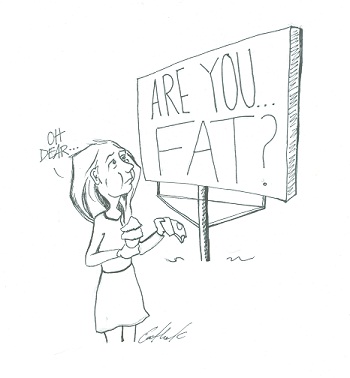Dying to be Thin

Cartoon by: Catherine Khamnouane
“Thinspiration” pages, collages of pictures and slogans designed to motivate weight loss, have popped up all over online social media outlets, including Pinterest, Facebook, Tumblr and Instagram. Do a quick search on almost any picture-based social media site and you will find a myriad of thinspiration material, usually in the form of pictures glamorizing the extreme skinniness of different models and celebrities. But beware: your body image and self-esteem may greatly suffer after looking at these pages. Most of these user-generated collections are packed with photos of unrealistically-shaped, ultra-skinny women, along with punishing slogans such as “Skip dinner, wake up thinner” and “Do not reward yourself with food, you’re not a dog.”
The act of girls glorifying pictures of other (usually dangerously) underweight girls is mind-boggling. The act of girls starving themselves because those other girls said it was the only path to becoming beautiful is terrifying. Thinspiration encourages a severely harmful way of living and only contributes to the daily insecurities millions of teenage girls face every day. Many defend thinspiration as a means to a happier life, but in truth, thousands of women and teens every day are bombarded with feelings of self-hate and unhappiness due to our skinny-exalting society, and thinspiration may be one of the worst offenders.
Hashtags such as #thinspo, #ana (pro-anorexia) and #mia (pro-bulimia) abound in social media. Click on them and you will find thousands of pictures of underweight women, focusing mainly on apparent ribs, prominent hip and collar bones, thigh gaps and concave stomachs. Thinspiration, or “thinspo,” sites often feature images or video montages of slender women, who may be anything from naturally slim to emaciated, with visibly protruding bones. Pro-ana and pro-mia bloggers, forum members and social networking groups alike post thinspiration to motivate one another toward further weight loss, continually ingraining in their followers’ minds that being skinny is the right way to go.
Perhaps most distressing are the pro-anorexic quotes interspersed between thinspiration pictures, such as “Do it for the thigh gap,” “1 like = 10 squats,” and the most frequently posted mantra, Kate Moss’s infamous quote: “Nothing tastes as good as skinny feels.”
Conversely, reverse thinspiration, or “fatspo,” features images of fatty food or overweight girls intended to induce disgust. The worst part about reverse thinspiration? Many of the pictures blogged of “overweight” girls are not what society would ever think to shun or label as truly overweight. Curvy? Maybe. “Not even a woman, but just a proud ball of fat”? Absolutely not.
There exists significant controversy between supporters and opponents of thinspiration. Some assert that thinspiration only glorifies eating disorders. Others argue that the purpose of thinspiration is to raise awareness or create a judgment-free zone for those suffering eating orders. Pro-ana organizations differ widely in their stances regarding thinspiration. Most claim they exist mainly as a non-judgmental environment for anorexics: a place to turn to, discuss their illness and support those who choose to enter recovery. Others deny anorexia nervosa is even a mental illness to begin with, claiming instead that it is a lifestyle choice that should be respected by doctors and family.
Most of society should, however, agree on the fact that anything praising a pro-anorexia or pro-bulimic lifestyle should not be lauded, and many argue it should not even be even circulated. While one cannot dictate what does and does not appear on the Internet, it is important to recognize the toll thinspiration, pro-anorexia and pro-bulimia blogs invariably take on the confidence and self-image of healthy bystanders.
Everyone has the freedom to believe what they want and share their own views however they so choose, but when is the line crossed? At its inception, thinspiration may have once been an effective means to rally the population into a more health-conscious lifestyle, but it has undoubtedly evolved into a monster, devouring the “fat” of partakers, along with their self-esteem.
Your donation will support the student journalists of Plano West Senior High School. Your contribution will allow us to purchase equipment and cover our annual website hosting costs.

This is my first year on the BluePrints staff. I have wanted to be a journalist since middle school, and I want to go to UT and major in Mass Communications....


